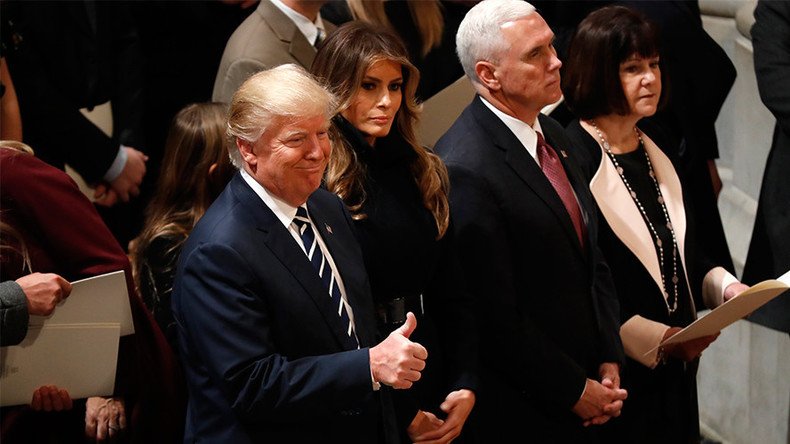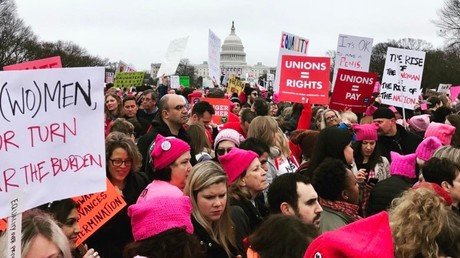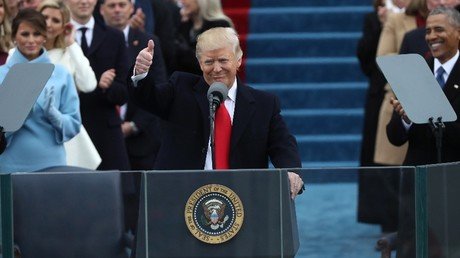Trump’s ‘old friends become allies’ goal refers to Russia – Virginia state senator

Trump’s intention is to end the provocative actions that the US took against Russia and normalize relations, Virginia State Senator Richard Black said, adding that this is a great time to draw back from war, unnecessary conflict, and regime change.
Donald Trump's first full day as US president saw thousands marching in Washington, DC as a part of the Women’s March. So-called sister events were held across the globe. Organizers said they wanted to send Trump a message “that women's rights are human rights.”
This followed violent and destructive protests that erupted across the US after Trump’s inauguration. In Portland, Oregon, demonstrators burned American flags. Other major cities saw violent clashes with police.
RT: Were you surprised by these pretty much unprecedented protests?
Richard Black: I am not surprised at all. There are people like George Soros who pay a great deal of money; I understand that many of these protesters have been paid $1,500 to $2,500 to attend. Most of the ones that I saw at the inauguration lacked energy, lacked passion... This is all just theatrics and it doesn’t mean anything.
RT: Why do you think people are feeling anger that Donald Trump is now the president?
RB: The Trump administration may bring about more dramatic change than we have ever seen in our lifetimes. And a great deal of that is going to be in the area of foreign policy. And I think that you are seeing some Republicans who are very nervous about what is going to happen, because he will fundamentally alter our foreign policy.
RT: Do you think Trump can unify the country? In his speech, he certainly thought he could.
RB: He will do that. We are still transitioning from the campaign, but there’s sort of a majesty that surrounds the presidency and very shortly you’ll see some of these other things fading away. They can only pay the protesters to be out there for so long. Interestingly, I looked at all of the protesters, almost all of them were white. There were very few Hispanics, Blacks. A very narrow group of people, and somehow they didn’t strike me as very genuine.
Gilbert Doctorow, the European Coordinator of The American Committee for East-West Accord, commented on the post-inauguration protests in the US: “I’d like to put this into context; the opposition to Trump is of two varieties: one is what you are seeing in the streets. I would call that opposition from below kind of film extras – they are making a lot of noise and catching the TV cameras, but they are not really any threat to Trump’s presidency. But there is another type of opposition which is coming from above, which is of vital importance and existential threat to the Trump presidency... In Capitol Hill, there is a different type of opposition, and they are the ones to watch.”
RT: Donald Trump set himself a big task; he said he wants to do a certain amount of things within 100 days. Do you think the expectations will be too great to start producing results quickly?
RB: I don’t think so. I think he can move quickly. He has already changed the presidential website. And he has changed the priorities for foreign affairs. It is interesting looking at some of the words: he said he wants more peace for the world, less conflict. He wants to find “more common ground.” His top priority is fighting ISIS and other terrorist groups. And he talked about joint military operations which, I presume, would mean alongside Russia. He wants to cut off funding for terrorist groups. Interestingly, he says he wants to “embrace diplomacy.” He says “we do not go abroad in search of enemies.” He said “we are happy when old enemies become friends and when old friends become allies.”
When he makes that reference to old friends becoming allies, I think he is referring specifically to Russia, which was our ally in the Second World War. And I think if you look at everything that he has said, I think it is his intention to end the provocative actions that we have been taking towards Russia, to normalize relations. I think this is a tremendous time. It is a time when we can draw back from war and unnecessary conflict, from regime change. He obviously has contempt for the old policy of regime change. So, I think it is a very hopeful time.
RT: Can Trump create alliances with Iran and China? Because the rhetoric has been different from that [regarding] Russia...
RB: It has been, and I think to some extent, we are going have to see how that plays out. I hope that there can be some normalization. The relations with China relate a great deal to our trading balance. And I think we are going to see a very tough position with China dealing with the trading balance. He is determined to return jobs to the US that have been sent overseas. So, there will be some inevitable tensions there.
Iran is very much a mystery because there are some signals that perhaps we can cooperate at some level. But I think that remains to be seen exactly where we head with Iran. Obviously, he wants to stabilize Syria, he wants the Assad regime to remain in power. He wants the terrorists out...
The statements, views and opinions expressed in this column are solely those of the author and do not necessarily represent those of RT.














